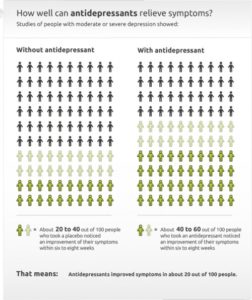I am not a doctor. I probably know more about psychiatric medications than most non-doctors, but I’m not qualified to give medical advice. Having said that, here is some of what I know about medications for Depression:
- They are effective for moderate, severe and chronic depression, but probably not for mild cases.
- All medications have side-effects. Antidepressant side-effects include sexual side-effects, nausea, weight gain, fatigue. drowsiness, insomnia, dry mouth, blurred vision and constipation.
- Antidepressants take four to six weeks to start to show therapeutic effects, though most of the side-effects show up in the first week.
 Effectiveness varies. Without antidepressants, about 20 to 40 out of 100 people who took a placebo noticed an improvement in their symptoms within six to eight weeks; that improved to 40 to 60 out of 100 people with antidepressants.In other words, antidepressants improved symptoms in about 20 more people out of 100. Notice that I said “noticed an improvement in their symptoms.” That is not the same as “cure” or even “significant reduction in symptoms.” For most of this research, any improvement, even one less symptom, was enough to score a “success.”
Effectiveness varies. Without antidepressants, about 20 to 40 out of 100 people who took a placebo noticed an improvement in their symptoms within six to eight weeks; that improved to 40 to 60 out of 100 people with antidepressants.In other words, antidepressants improved symptoms in about 20 more people out of 100. Notice that I said “noticed an improvement in their symptoms.” That is not the same as “cure” or even “significant reduction in symptoms.” For most of this research, any improvement, even one less symptom, was enough to score a “success.”- Cognitive behavioral therapy and second-generation antidepressants (SSRIs like Prozac or Luvox) have been shown to be about equally effective as treatments for major depression.
- A combination of cognitive behavior therapy and antidepressant medication appears to be more effective than medication alone.